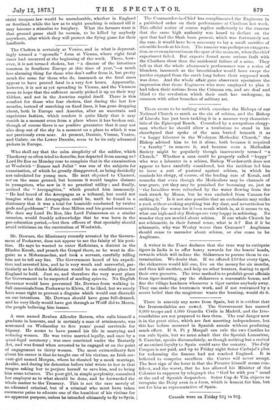There seems to be nothing which exercises the Bishops of
our National Church so much as the sin of schism, and the Bishop of Lincoln has just been tackling it in a manner very character- istic of the Episcopal Bench. Consulted by a scrupulous clergy- man whether he should allow a tombstone to stand in his churchyard that spoke of the man buried beneath it as "a happy labourer in the Wesleyan Methodis:, Church," the Bishop advised hini to let it alone, both because it required "a faculty" to remove it, and because even a Methodist Society might be popularly though inaccurately termed "a Church." Whether a man could be properly called "happy" who was a labourer in a schism, Bishop Wordsworth does not appear to have carefully considered, but the incident led him to issue a sort of pastoral against schism, in which he reminds his clergy, of course, of the leading case of Korah, and remarks that even though the Methodists may be channels of true grace, yet they may be punished for becoming so, just as "the Israelites were refreshed by the water flowing from the rock struck by Moses, but he was excluded from Canaan for striking it." Is it not also possible that an ecclesiastic may strike a rock without evoking anything but dry dust, and nevertheless be spiritually the worse for it ?—a result which is, at it seems to us, what our high-and-dry Bishops are very happy in achieving. No wonder they are morbid about schism. If our whole Church be not schismatic, in their formal sense, what is it ? But if it be schismatic, why was Wesley worse than Cranmer ? Anglicans should cease to maunder about schism, or else cease to be Anglicans.


































 Previous page
Previous page